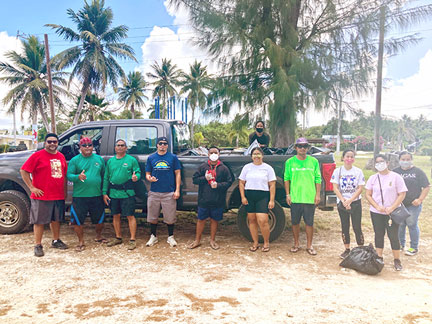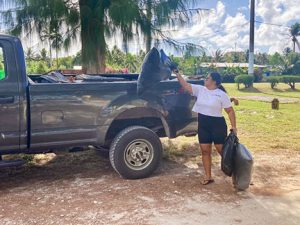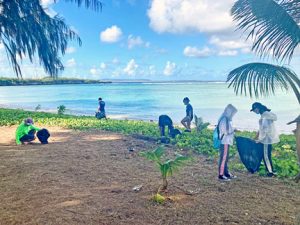How do we stop illegal dumping?
Preparing for a Universal Garbage Collection

Volunteers spent early morning Saturday last week to help pick up trash at PakPak Beach in Afetna, as organized by the Bureau of Environmental and Coastal Quality. Among the volunteers was CNMI Office of Planning and Development director Kodep Ogumoro-Uludong, leftmost, who stressed that behavioral change is key in addressing the islands’ garbage problem. (Iva Maurin)
Early this week, a video of a man being caught illegally dumping bags of garbage in Koblerville went viral, drawing the ire of many residents who were quick to berate the deplorable action, which eventually led members of the man’s family to also post a video of themselves cleaning up after the “mess,” with an appeal to not further share the viral video.
Both videos have since been removed, at least on Facebook, but one thing remains, that there are people on island who continue to dump their garbage just about anywhere, unashamedly waiting on the government, or on community volunteers, to pick up after them.
Garbage has been a long-standing problem in the CNMI. Last year, in June, no less than Gov. Ralph DLG Torres issued a strong “shame on you” message to those who keep wantonly throwing garbage, stressing that there is absolutely no justification for anyone to do that, under any circumstances.
Bureau of Environmental and Coastal Quality administrator Eli Cabrera, at the time, echoed the message, adding that BECQ’s Litter Control Section has been going out daily and responding to complaints that their office receives, issuing citations to those who dispose their trash in undesignated areas, as with the case in the viral video.
Aside from BECQ, the Governor’s Council of Economic Advisers also highlighted the seriousness of a problem illegal dumping and littering are in the community, pushing for a universal garbage collection in the CNMI.
Universal garbage collection
The council has recognized garbage as a “consistent hurdle” into establishing the CNMI as a world-class tourist destination by 2031. They believe that along with strict enforcement of anti-littering laws, the establishment of a universal garbage collection will help ensure a CNMI that is safe, clean, and respectable for both residents and tourists.
Council committee chair Alex Sablan, at a presentation before the Saipan Chamber of Commerce last week, spoke about the need to provide for the people the ability to properly throw their garbage, in their homes, and in public spaces.

Division of Coastal Resources Management communications specialist Colleen Flores placing bags of trash collected by volunteers into the BECQ truck that would then head to the transfer station where the volume of trash will get tallied. Every first Saturday of the month, BECQ’s Cleanup Brigade brings together volunteers from within the organization and the community, to clean up a pre-identified area for two hours, where afterwards, the trash that gets collected is hauled away for disposal at the Marpi landfill. (Iva Maurin)
“All we’re doing right now is talking about the idea of getting back into the discussion of re-instituting universal garbage collection which is basically curbside pick-up… But, taking into account public spaces… We think a lot of the illegal dumping and a lot of our trash issues through education… processes that will hopefully resolve our trash issue.”
The council’s proposal endorses that the cost of garbage collection services be integrated into the billing the Commonwealth Utilities Corp. issues, where utility provision is combined with garbage collection and disposal—a practice that is done in communities in the mainland, like Orlando and Florida.
Under the proposal, garbage collection zones are to be established across Saipan to aid to its logistical management. The council recommends the creation of five zones that mirror the existing electoral precincts—to maintain an equal accounting for the population within each zone. There will also be communal garbage transfer stations within each zone, with the government being proposed to tap into the services of the already existing garbage collection companies operating on island.
Standardized rates, charges, and fees across customers and across zones must be ensured, according to the council.
Behavior change
In a separate interview, CNMI Office of Planning and Development director Kodep Ogumoro-Uludong shared with Saipan Tribune that their office is aware of the recommendation made by the council and that they are in close partnership with the Department of Public Works, and the Rota and Tinian mayors’ offices on solid waste concerns.
“We’re aware of that interest by the Governor’s Council of Economic Advisers, and we’re actually folding that into an RFP that’s going to be coming out, to also consider universal municipal trash collection as part of an overall plan that we’re seeking to put together for an integrated comprehensive Solid Waste Management Plan.”
He also noted that the plan requires the necessary feasibility studies, including researches on best practices in other places.

Volunteers from Saipan Southern High School spent early morning Saturday last week to help pick up trash at PakPak Beach in Afetna, as organized by the Bureau of Environmental and Coastal Quality. (Iva Maurin)
Ogumoro-Uludong, who was one of the volunteers at the BECQ’s cleanup at Pakpak beach last Saturday, also stressed that they are looking at how to conduct behavior change among the community to help solve the islands’ garbage concerns.
“One key is behavior change. That’s also something that we’re looking at… how to conduct a behavior change campaign [that is] island-wide to get our people to do their part, and recognize the importance of keeping trash off of our lives land, out of our water.”
“This is our home, and the cleanliness of our environment directly translates into the health of, not just our natural resources, but of our people,” he added.
Help keep the island clean and report any littering and illegal dumping to BECQ at 664-8500. Violators will be fined with a penalty fee of $25 to $5,000, based on the weight, type, and location where the littering took place, as guided by the Litter Control Penalty Fee matrix.























